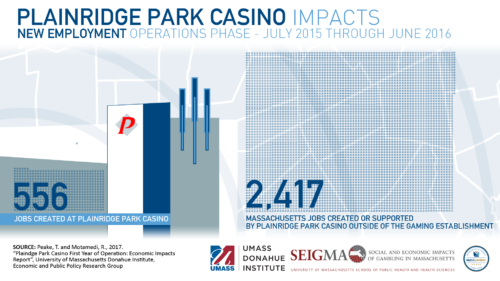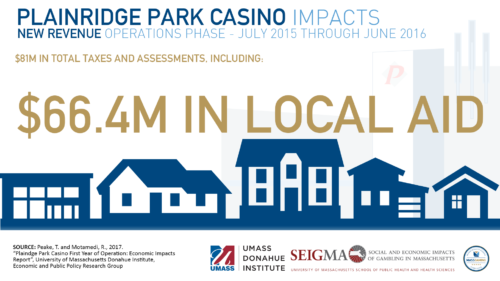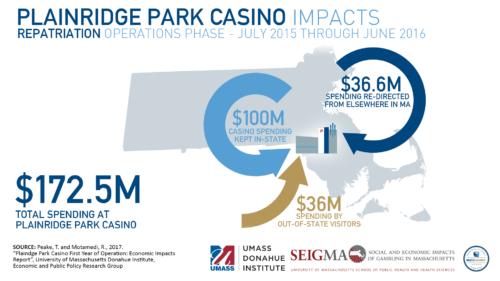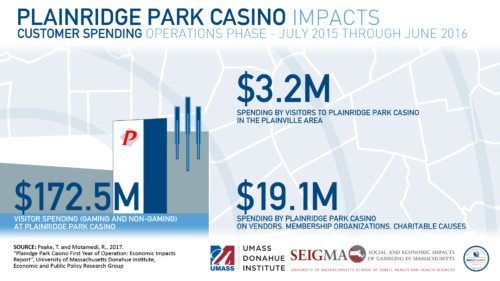Research Update: Plainridge Park Casino economic impacts released for first year of operation, Analysis concludes $100M in out-of-state spending recaptured
- October 12, 2017
- by MGC Communications
- 0 comments
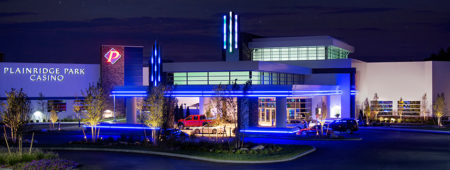
HADLEY – The UMass Donahue Institute released an analysis of the impacts from Plainridge Park Casino’s first year of operation.
The Institute worked directly with the Massachusetts Gaming Commission (MGC) and Plainridge Park Casino (PPC) to determine the economic footprint of PPC’s operations, including employment, wages, vendor spending, and fiscal impacts from taxes and other assessments paid to government. Researchers also analyzed how shifts in patron spending as a result of gaming expansion affected the state.
The economic impacts of a new casino opening in Massachusetts are not limited to the impacts of employees spending new wages in their communities. The casino also purchases goods and services from other firms and state and local governments collect taxes and other assessments from the casino, allowing them to spend more than they would otherwise have been able to. Alternately and as with any new attraction, some of PPC’s revenue is coming from consumers who previously spent their money at other Massachusetts businesses, and those businesses will be affected by the loss of support.
Analysis highlights:
- In PPC’s first 12 full months of operation (July 2015 through June 2016), patrons spent approximately $172.5 million on gambling and non-gambling activities at the facility.
- The majority of patrons surveyed at PPC were identified as “recaptured” patrons who would have spent their money gambling out of state had PPC not opened, while others were out-of-state visitors whose visit was prompted by the casino. Recaptured patrons are responsible for $100 million of the $172.5 million spent at PPC. Out-of-state residents spent $36 million at PPC. Another $36.6 million was spent by Massachusetts residents who otherwise would have spent their money elsewhere.
- The largest single source of new economic activity came from $81 million in taxes and assessments collected from the casino’s gross gaming revenue. Of those funds, $77.6 million in payments were made to various Massachusetts government entities with $66.4 million given directly to cities and towns in the form of local aid.
- PPC created approximately 556 new jobs at the casino and $17.8 million in wages. In total, PPC created or supported 2,417 jobs in the Commonwealth with 1,633 jobs in the private sector.
- PPC supported $19.1 million in spending on vendors, membership organizations, and charitable causes.
- Visitors to PPC spent an estimated $3.2 million in the Plainville area in the course of visiting the casino.
MGC Chairman Steve Crosby said, “The principal motivation for the Legislature in crafting the Gaming Law was to recapture the approximately one billion spent annually by Massachusetts residents at out-of-state casinos. This report demonstrates emphatically that we are in the process of accomplishing that important objective. ”
“It is exciting to see information beginning to emerge from the operational phase of the SEIGMA [Social and Economic Impacts of Gambling in Massachusetts] study. Going forward, this data will provide an ongoing assessment of how conditions change during the early years of casino operations,” said Rachel Volberg, Principal Investigator of the SEIGMA group.
“As a result of the Commonwealth’s forward-looking gaming legislation, EPPR [Economic & Public Policy Research] and the SEIGMA team have been able to pursue an ambitious and first-of-its-kind study on the operations of casinos in Massachusetts, of which PPC is only the first part. By coupling detailed data from the casino and an extensive survey of its patrons, we have been able to provide a clearer picture of the economic role of a casino than ever before,” said Mark Melnik, Director of UMass Donahue Institute’s EPPR group.
Read the full report.
The UMass Donahue Institute is a member of the Social and Economic Impacts of Gambling in Massachusetts (SEIGMA) project team that has been charged with carrying out the research agenda of the Massachusetts Gaming Commission.
###
Established in 1971, the UMass Donahue Institute is a public service, research, and economic development arm of the University of Massachusetts President’s Office. Our mission is to apply theory and innovation to solve real world challenges and enable our clients to achieve their goals and aspirations. We serve clients in the public, non-profit, and private sectors in the Commonwealth and throughout the nation and the world. For more information, www.donahue.umassp.edu.
CONTACT: Ken LeBlond, Marketing Communications Manager, UMass Donahue Institute, kleblond@donahue.umassp.edu, (413) 545-3452.
CONTACT: Elaine Driscoll, Director of Communications, Mass Gaming Commission, elaine.driscoll@state.ma.us, (617) 571-2964.
